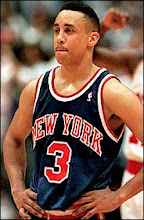For much of Sunday's loss, it was the Saints that played the brand of football that we had seen from the Colts for over five months. They played clean, they played smart, and most importantly of all, they played aggressive.
I thought that because New Orleans relied so much on their opponents making mistakes, that the Colts - a team that rarely shoots themselves in the foot - would prevail. They didn't, and the Saints were praised for a huge "upset" victory.
But, was New Orleans' win really an upset?

At some point between early December and early February, the football world decided that the once miniscule gap between the Colts and Saints had widened to the point where Indianapolis was suddenly the heavy favorite. The main culprit was the two team's performances in their respective Conference Championship games. One team overwhelmed their opponent in the second-half behind one of the best postseason performances in the career of their MVP quarterback. The other needed five fumbles, an overtime, and a ridiculously reckless throw by Brett Favre to punch their ticket to the franchise's first Super Bowl.
What we all forgot along the way, was that all the signs pointed to this being an even matchup.
The Colts' two best wins (record-wise) of the season came against Arizona and New England - two teams that the Saints pasted by a combined 45 points. In the postseason, New Orleans had just gotten by two Hall-of-Famers in Kurt Warner and Brett Favre, while the Colts beat-up on the inexperienced Joe Flacco and Mark Sanchez. Someone tell me how overwhelming a nine-win, one-dimensional Wild Card team translated to defeating a 13-win, offensive juggernaut like New Orleans?
This, however, is not about excuse-making, it's just the realization that maybe the Colts weren't as dominant as we thought. Take a look back at the Colts in 2009... They didn't beat anyone with less than six losses. They needed seven fourth-quarter comebacks. Their two best wins were a
Statistically, the Colts had a very good offense (6th scoring, 9th in yards-per-game), and a solid, but middling defense (8th in scoring, 18th in yards-per-game). In the final regular season DVOA rankings, they came in 8th. All of this shows that the Colts were a great team, but hardly an unstoppable force.
The NFL is now a passing league, and every single division-winner had an upper-level quarterback. With that in mind, fourteen of Indianapolis' sixteen wins came against the following quarterbacks:
David Garrard(twice), Chad Pennington, Seneca Wallace, Kerry Collins, Marc Bulger, Alex Smith, Matt Schaub (twice), Joe Flacco (twice), Vince Young, Kyle Orton, and Mark Sanchez.
Yeesh.
Had this team not started 14-0, would we think a Super Bowl victory was a given? All of this is very similar to the 2008 season. Had Indy not scored an impressive comeback over the eventual champion Steelers on the road, would we have falsely believed they could make a run? In both instances, probably not.
Obviously, this is a better Colts' team than the squad from '08. In fact, this was a great Colts team; any time you win 14 games you earn this distinction. But, because of the 14-0 start, they were placed amongst the all-time great teams - a label that was both illogical and undeserved. This team was never to the level of the 2007 Patriots, much less the 1985 Bears, regardless of what their record said. If we weren't all so preoccupied with the irrational dreams of a 19-0 season, maybe we would've realized that.
None of this takes the sting off of a Super Bowl loss. But, in hindsight, Sunday night's result wasn't as much of an upset as we made it out to be.



No comments:
Post a Comment